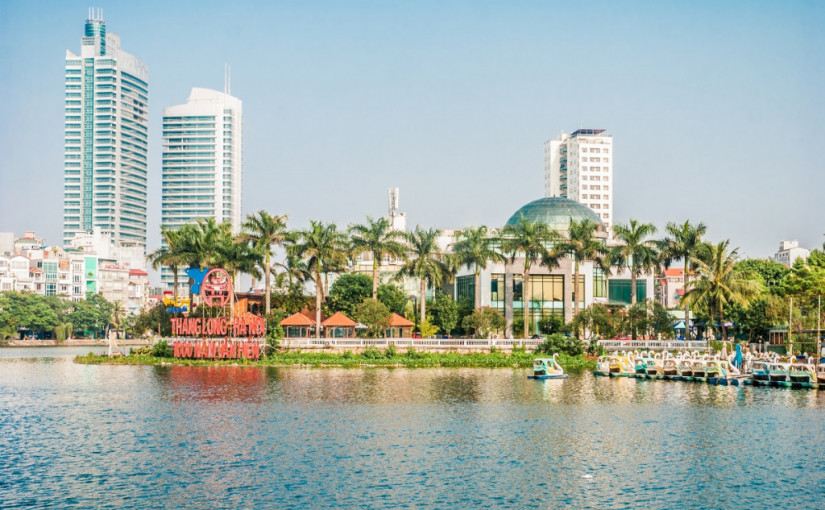The expansion success story is one of the benchmarks for business growth; It’s no wonder that many founders openly conveyed this ambition on various occasions. Starting from national, regional, then global expansion. In the Indonesian startup ecosystem, several players have enough courage to expand overseas. The level is still regional, trying to work on the market in Southeast Asian countries.
Judging from the existing trend, expansion is generally carried out for two purposes. First is strengthening business operations, Singapore and India are by far the most favorite. Startups create operational offices or R&D centers. Second, the expansion opens up new market shares, increases users, and business traction. For this purpose, Vietnam looks more promising and becomes a priority.
Currently, there are several local startups that are also offering their services in Vietnam. Call it Gojek, Ruangguru, Traveloka, and PasarPolis. In a virtual discussion opportunity held by the Indonesian Embassy in Hanoi on August 12, 2020, Traveloka representatives said that before the pandemic their business had seen good growth and after the pandemic, various plans had been made including collaboration with various parties.
The Indonesian Ambassador to Vietnam, Ibnu Hadi, in the discussion entitled “Digital Economy Opportunities in Indonesia and Vietnam” said the government would help “open the door” for Indonesian startups to open markets to Hanoi. Efforts have been made, including to intensively starting collaborations with players in the startup ecosystem there.
Several venture capitalists from Indonesia have also provided funding for Vietnamese startups. In the early stages, there are Venturra, East Ventures, and Alpha JWC Ventures; while at the next stage there are Openspace, Northstar, EV Growth.
About Vietnam market
East Ventures’ partner, Melisa Irene told DailySocial on the promising Vietnam’s internet market. Compared to Indonesia, she said the ecosystem development is 3-4 years behind Indonesia. East Ventures has also invested in two startups there, CirCo (coworking space operator) and Kim An Group (fintech lending for SMEs).

“Vietnam is potential because its second largest population after Indonesia, the majority age is very young, and Vietnam has recently opened its economy to the global market. This will accelerate the growth of the digital economy in Vietnam in the next few years,” Irene added.
Kim An Group’s Series A funding was successfully closed last week. Apart from East Ventures, Patamar Capital is also involved in the round. Patamar Capital is also a fairly active venture capitalist in the Indonesian ecosystem. They operate in several countries in Southeast Asia and have representatives (partners) in each region.
We had the opportunity to interview Patamar Capital’s partners, Dondi Hananto (Indonesia) and Shuyin Tang (Vietnam).
Working daily with the ecosystem, Shuyin admits that Vietnam are still several years behind Indonesia. However, if you look at the continued development, he feels optimistic about the future of the digital startup. The infrastructure development and solid talent underlie this argument.
Regarding fintech, the most developed business landscape in the region, Shuyin said that in Vietnam, the sector tends to be more controlled compared to other countries. The State Bank of Vietnam released a very limited number of licenses for fintech, both for payment platforms, loans, and other business models.
“Alyhough, digital payments is a fairly active space in Vietnam. Momo recently announced that it has reached 20 million users since it was launched 10 years ago. Other well-known players are Moca (partnered with Grab) and ZaloPay. Gojek also announced to have taken a majority stake in WePay, which means we will finally be able to enjoy GoPay,” Shuyin explained.
The business climate is also different compared to Indonesia. As of August 2020, there are 158 p2p lending startups registered with the OJK in Indonesia. Meanwhile in Vietnam, Shuyin observed the conditions are the opposite, it can be said that fintech lending is more complicated. Related startups must collaborate with existing financial institutions, both from banking and non-banks. There is no “multi-finance enterprise” model in Vietnam, nor is there a specific legal framework for p2p lending.
“I have to say that it is more difficult for lending-focused companies to debut in Vietnam. These companies operate in the ‘gray zone’ or have to partner with banks. And once you reach a certain scale, operating in that zone is not an option, it has to be. find a way to get a license fast. Usually, this process will be long and expensive,” she added.

Aside from fintech, in Patamar Capital’s thesis, there are also several startup landscapes that are prioritized in the Vietnamese market, such as healthtech, edutech, logistics, and SME empowerment services.
Vietnam’s market characteristic
Venturra is one of the venture capitalists from Indonesia who has set foot and a dedicated team in that country. Venturra Partner Raditya Pramana reveals his analysis to DailySocial on why Vietnam has become attractive to founders planning expansion.
He said, when talking about market share, once an Indonesian startup wants to expand regionally, they will be presented with two options: the Philippines and Vietnam.
“After Indonesia, a country with a large population are the Philippines and Vietnam. If we compare the two options, the complexity is decisive. The Philippines is an archipelago, separated; while Vietnam is only divided into two large regions, one Hanoi in the north and the other in Ho Chi Minh City. in the South. It’ll become an entry point that makes it easier for companies to build their presence,” Raditya said.
An interesting fact, Raditya also highlighted the talents. Whereas in Indonesia, startups tend to find business talent easier and find it difficult to get technical talent, Vietnam is quite the opposite with less business talent, while technical talent is easier and more affordable. This can also be a consideration for digital startups who want to build a base in the country.
“In terms of market size, it is not as big as in Indonesia, but the development can be very fast. As is known, they also get momentum due to the trade war between the United States and China. There are many manufacturing companies there. The political reforms that have taken place in recent years have provided many opportunities for growth. economy, including making it easier for foreign companies to be there,” Raditya continued.

Venturra’s solid vision has been shown by placing a team in Vietnam since March 2020 to be directly involved in its ecosystem. In Q1 of this year, they have invested in two Vietnamese startups, while the target is to reach 5-7 startups. The pandemic requires Raditya and the team to make many adjustments to their investment plans.
“Our main focus is clearly in Indonesia because we are a local company and understand this market better. However, when talking about foreign markets, we have two targets, Vietnam, then Singapore [because it is a regional business hub],” he said.
As a country with the potential for market expansion, Shuyin gave his view. Vietnam is a naturally growing market that needs to be considered for regional expansion. Interestingly, from his observations in Vietnam, after Covid-19, interest in investing in the country shot up. Including because of Vietnam’s successful strategy in stemming the impact of the pandemic.
“In my opinion, at the top level, yes, Indonesia and Vietnam have similar characteristics. A young population, increasing income, maturing technology ecosystem, etc. However, one thing that the team has seen time and time again is that there are many local nuances and this difference becomes important,” Shuyin said.
Another Patamar Capital partner, Dondi Hananto, added that he agreed with the many similarities. “When you are in Jakarta or Ho Chi Minh City, or in Hanoi or Surabaya, you will find traffic everywhere, and millions of motorbikes. But a closer look, local nuances will be very important in understanding customer behavior.”
“For example, on my trip to Vietnam, I never set foot in a mall. Yes, we have meetings in cafes or restaurants, but not in shopping centers. It’s different from every day in Jakarta, usually before the pandemic I often held meetings at malls, even our offices are in the coworking space inside the mall. While this may seem trivial, I believe things like this affect the way customers behave and may shape how businesses approach the market, “added Dondi.
Tips for startups
With these conditions, there are some tips for startups planning to open a market in Vietnam. First, as Irene said, understanding local business conditions needs to be a strong foundation for each founder. From East Ventures’ analysis, there are three challenges that must be considered, the limited talent at the mid-management level and above, changing regulations, and business practices based on relationships. All three are business executors that is very good at local dynamics.
If you look at the steps of Indonesian startups that are already present in Vietnam, it seems that this is appropriate. For example, what Gojek did by appointing local Phung Tuan Duc as CEO to localize the company’s business strategy there. Ruangguru has done something similar by developing a special brand and platform that is unique to local elements, Kien Guru.
Radit also mentioned that the managerial style must be adjusted for Indonesian startups to expand there. He sees that a community-driven strategy can be relevant, given the existing digital trends. Such as the growth of the social commerce business model, the popularity of Facebook, and others. “What is clear is that the Indonesian playbook cannot be fully replicated there. Customer behavior is different from Indonesia, you must have a strong leader there.”
As Dondi said, based on some of the similarities, founders also need to really understand the similarities in market share between these countries, find out what differences need to be adjusted. “In my opinion, expansion from Java to other islands in Indonesia is already very complicated due to differences in population density, infrastructure, behavior, recruitment, etc. Expanding to other countries is 100 times more complicated because you have to think hard about legal and operational barriers. , including language. ”

And what was also emphasized was the selection of the right local team and partners. The realizations vary, for example through acquisition or acquihire as was done by Traveloka or Gojek, but it does require a high cost.
Why expand to Vietnam?
In Venturra’s portfolio, one startup has arrived in Vietnam, Ruangguru. However, Raditya did not really encourage his startup to quickly expand outside. He will recommend Vietnam as a destination, provided that the startup is really ready and feels that it has reached the best point in running its business on a national scale.
Meanwhile, according to Dondi, it is natural that Indonesian companies must have the will to expand regionally. Businesses must be prepared for these consequences, otherwise, it will be a waste of valuable resources and time. For some businesses, Indonesia’s domestic market is large enough, so that they can increase the maximum scale without expanding to other countries.
“We do have several business portfolios that have grown and are planning to expand to Vietnam, but we want to ensure that this is done carefully,” Dondi said.
–
Original article is in Indonesian, translated by Kristin Siagian
Header: Depositphotos
